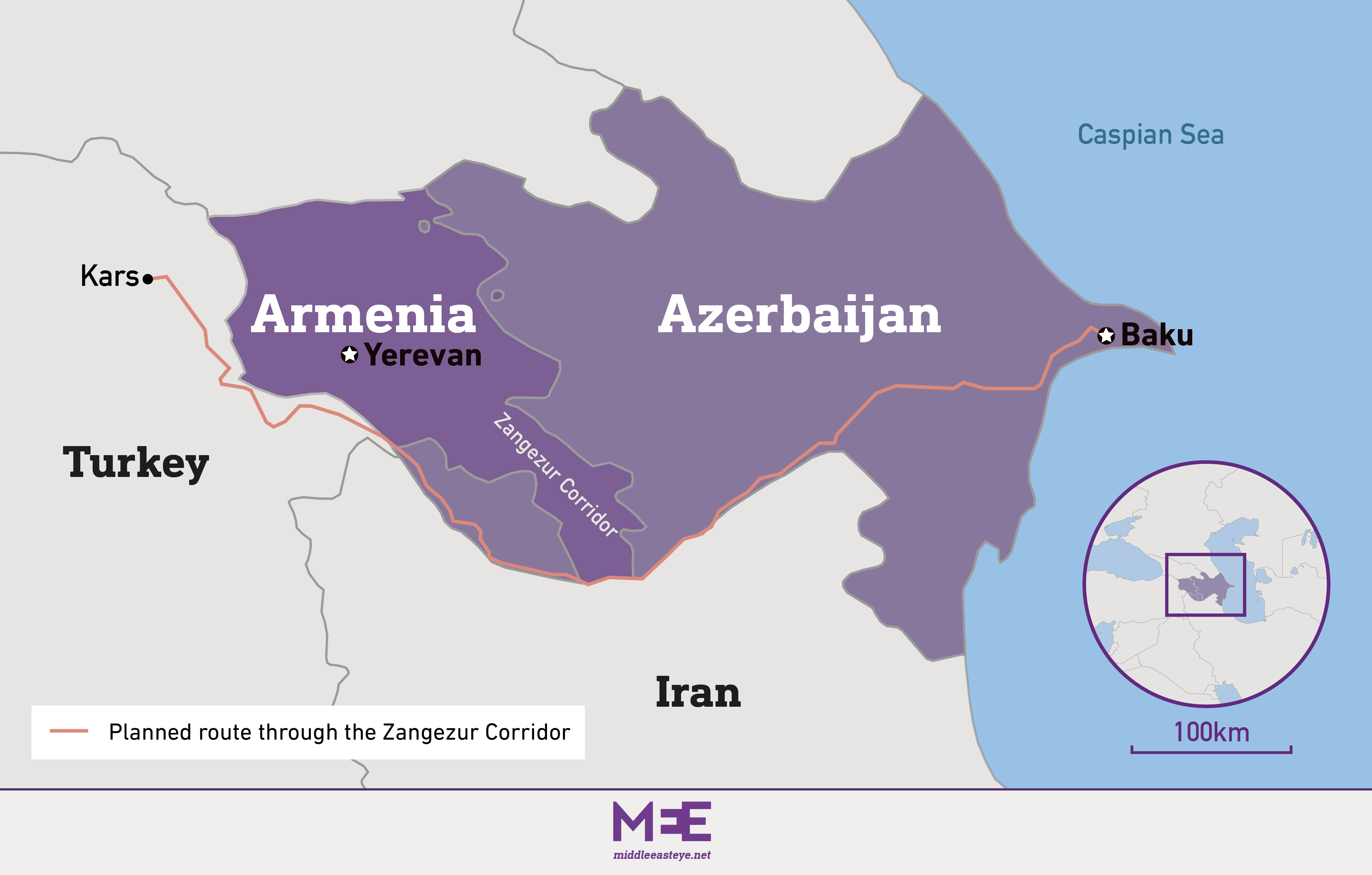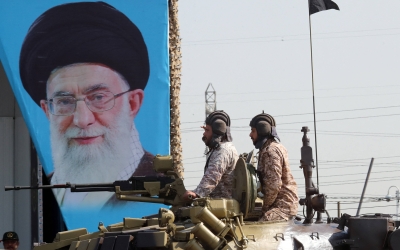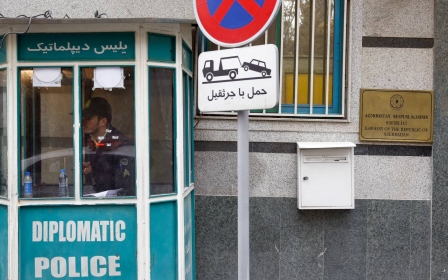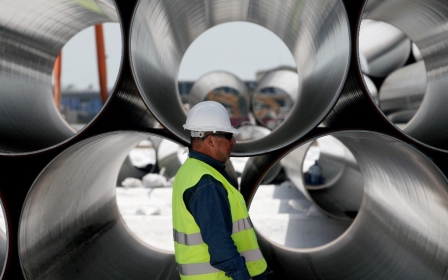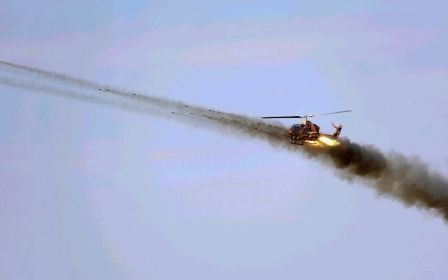Why Iranians are calling for war with Azerbaijan
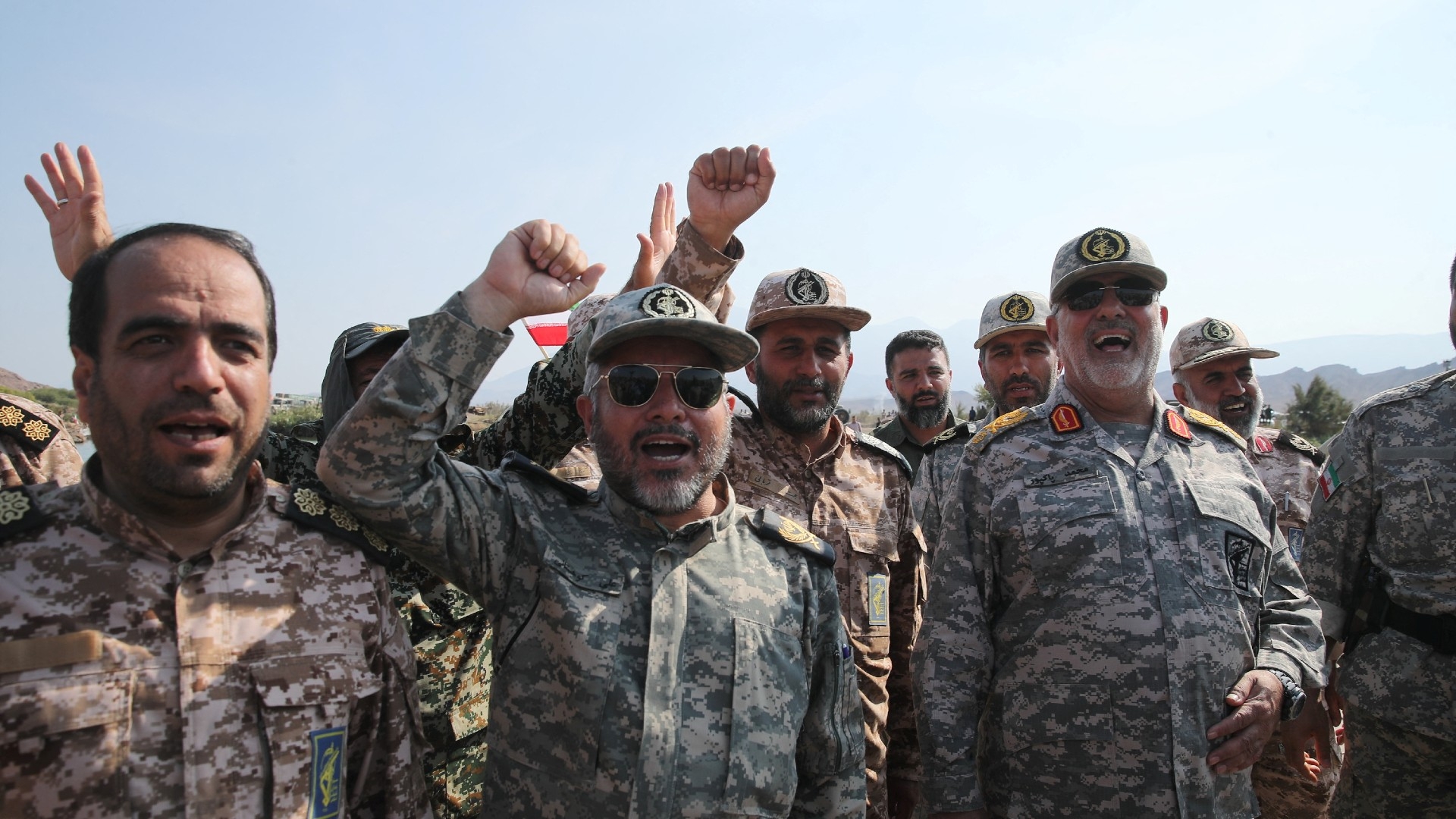
To Soroush, a 26-year-old history student, the recent tensions between Azerbaijan and Iran are not something to be fearful of - they’re an opportunity.
“My only wish is the return to Iran of our Azerbaijan, which was separated from its motherland decades ago,” the Iranian tells Middle East Eye.
All Tehran needs, he says, is for Azerbaijan President Ilham Aliyev to “provide Iran with a legitimate reason” to attack. "The Republic of Baku,” as he calls it, “has no future apart from rejoining its motherland."
Soroush’s sentiments are increasingly common in Iran. Though no reliable data is available, it’s the kind of opinion you hear particularly among the young, and from people of various political leanings.
Relations between Tehran and Baku have been tetchy at the best of times. But since 27 January, when an attack on the Azerbaijani embassy in Iran killed a security officer, ties have only worsened. Aliyev accused the Iranian establishment of being behind the attack.
One of the largest elephants in the room is Baku’s friendly relationship with Israel. Israel’s foreign minister on 29 March said his country “shares understandings on the threat of Iran” with Azerbaijan, drawing demands from Tehran that Baku explains itself.
Adding to the tension is last month’s assassination attempt on Jan Fazil Mustafa, an Azerbaijani MP critical of Iranian influence. Azerbaijan also recently arrested eight people on charges of spying for Tehran.
Before all this, in October, Iranian intelligence said a key suspect in the terror attack on the Shahcheragh shrine in the southern city of Shiraz, which killed 13 people, was a citizen of Azerbaijan.
The animosity has deep roots. Some Iranians like Soroush only refer to the Republic of Azerbaijan as the “Republic of Baku”, a reference to the historical territory of Azerbaijan that includes two provinces in Iran’s north.
Iran lost control of various Caucasus territories in the early 19th century following wars with Russia, including modern-day Azerbaijan, Georgia, Dagestan, Armenia, and Igdir in Turkey. The agreements that ceded those lands continue to rankle Iranian nationalists, and are commonly cited to criticise bad contracts or deals.
Geopolitical reorganising
The Nagorno-Karabakh war of 2020 changed the game on Iran’s northern borders. For three decades the mountainous territory had been in Armenian hands, before it was conquered by Azerbaijan using advanced Turkish and Israeli weapons.
That geopolitical reorganising unnerved Iran, which has repeatedly expressed its concern about the Russian-backed settlement’s effect on its national interests.
One example is the warnings issues by the Iranian military and other authorities about the disruption of transit routes for Iranian goods to Russia, and the potential border changes between Iran and Armenia with the opening of the Zangezur Corridor transit route.
The planned corridor connecting Azerbaijan and its Nakhchivan exclave to Russia and Turkey without Armenian checkpoints is designed to facilitate connectivity between Asia, Europe and the Middle East, and the idea has been promoted heavily following Baku’s successes in the Nagorno-Karabakh war.
Yet its opening has the potential to drastically alter the geopolitical landscape of the region, with possible implications for Iran's national security and strategic interests.
As a result, Iranian authorities have deployed the army and held military practices on the Azerbaijan border, while expressing concerns about these changes and calling for caution and careful consideration of the implications. Armenia, too, vehemently opposes the scheme.
What are Iran’s worries?
The Zangezur Corridor transit route is also designed to tie Turkey, Azerbaijan and Central Asia together, a region that Ankara and Baku describe as the “Turkic world”.
“This corridor crosses the border of Iran with Armenia, and its implementation means removing Iran from the geopolitics of the Caucasus,” says a Tehran-based foreign policy analyst, who writes for reformist media. Like all of the sources for this story, he spoke on condition of anonymity due to security concerns.
'Iran’s way to Europe is through Armenia, Azerbaijan and Turkey. If Armenia’s province also falls into the hands of Azerbaijan, it will become a big leverage'
- Iranian analyst
“This action could be a prelude to the occupation of Armenia’s Syunik province, the province through which the Zangezur Corridor passes. The entire border between Iran and Armenia is located within the province of Syunik, and the annexation of this province to the Republic of Azerbaijan would mean the complete removal of the border between Iran and Armenia.”
According to the analyst, if the Zangezur area, as Syunik is also known, falls into Baku’s hands “everything will fall into their hands”.
Azerbaijan and Turkey would have the upper hand on vital trade routes, he warned, and could cut Iran off from Europe any time it wanted.
“Iran’s way to Europe is through Armenia, Azerbaijan and Turkey. If Armenia’s province also falls into the hands of Azerbaijan, it will officially become a big leverage,” he added.
“On the other hand, when the Turkic world is connected, Iran will lose the whole of Central Asia, and this is a catastrophe for Iran.”
'Infiltration'
Some Iranians believe their country isn’t being forceful enough.
"I am seriously concerned that if the Islamic Republic doesn't take action, within the next five years, people in Tehran and other areas will need visas to visit the provinces of Eastern Azerbaijan and Western Azerbaijan," a nationalist political activist based in the northwestern city of Tabriz told MEE.
The activist echoes the belief of many Iranians that Baku and Ankara are trying to separate the Iranian provinces of Western Azerbaijan and Eastern Azerbaijan from Iran. The provinces are home to Azerbaijani people who speak Azeri and Turkish.
"During the 2020 [Nagorno-Karabakh] war, the Islamic Republic should have supported Armenia, which was in our national interest. Instead, they supported Azerbaijan," the activist said.
He added that the Islamic Republic's approach to Baku, called “Umma-ism”, views Shia-majority Azerbaijan as a territory of Islam.
The activist claimed the four representatives of Supreme Leader Ali Khamenei in the provinces who supported Azerbaijan in the Nagorno-Karabakh war were “misled by people who said that since the US was supporting Armenia”, Iran should support Azerbaijan.
There are a few other things that worry the nationalist activist. He thinks the Iranian ruling establishment has been infiltrated by Turkey and Azerbaijan, an opinion that has no evidence to back it up but is rooted in the perception that Iran has dealt with developments on its northern border weakly.
The activist also noted the prevalence of Azerbaijani media in Iranian Azerbaijan, which seem tacitly permitted by Iranian authorities.
Annexation of the provinces is a commonly expressed fear. The Tehran-based analyst said the Zangezur Corridor would essentially amount to annexation of Armenian territory, and would give Aliyev enough self-confidence to move forward with what he described as a “longstanding plan”: annexation of Iranian Azerbaijan.
"When it gets rid of its Armenian problem, then it would focus on Iran with the help of Israel and Turkey," the analyst warned.
The spectre of Israel
Iranian officials and analysts are increasingly concerned about Israel's influence on Azerbaijan's Iran policy.
A foreign policy analyst based in Tabriz told MEE that Iran is unnerved about the apparent impact that Brenda Shaffer, a pro-Israel US professor at the University of Haifa, has on Azerbaijan’s policies through her allegedly close relationship with Aliyev. Shaffer has denied accusations of lobbying for Baku.
'Israel seeks to exploit ethnic fault lines and create fake sensitivities to exacerbate existing tensions between Iran and Azerbaijan'
- Iranian policy analyst
The Tabriz-based analyst said Israel wants to increase tension and insecurity along Iran’s northwestern borders.
“The presence and influence of Israel in Azerbaijan serve two main purposes: firstly, it demonstrates Israel's power of influence among the population, which is predominantly Shia and of Iranian descent.
"Secondly, Israel seeks to exploit ethnic fault lines and create fake sensitivities to exacerbate existing tensions between Iran and Azerbaijan.”
A former Iranian diplomat told MEE that Israel also plays a role in Azerbaijan’s aggressive policies towards Armenia, though it maintains secret intelligence cooperation with both countries.
Despite the heady rhetoric and concerns, analysts don’t expect a conflict any time soon. As an Iranian foreign policy expert told MEE: “Any conflict would benefit Israel, and the Islamic Republic would need to have patience.”
That patience could be tested if Azerbaijan moves forward with the corridor, however, with the expert saying Iran must act decisively and enter a “limited war”.
That conflict would be extremely dangerous, the expert acknowledged, and Tehran may find it can actually put the brakes on Azerbaijani moves if it develops a stronger relationship with Washington.
This article is available in French on Middle East Eye French edition.
Middle East Eye propose une couverture et une analyse indépendantes et incomparables du Moyen-Orient, de l’Afrique du Nord et d’autres régions du monde. Pour en savoir plus sur la reprise de ce contenu et les frais qui s’appliquent, veuillez remplir ce formulaire [en anglais]. Pour en savoir plus sur MEE, cliquez ici [en anglais].


